The journey to weight management and overall health begins with understanding your individual macronutrient requirements. Try our Macronutrient Calculator below to get started.
Macronutrients, including carbohydrates, proteins, and fats, serve as the cornerstone of a balanced diet, providing essential energy and supporting various bodily functions. However, determining the right balance for your unique needs can be challenging.
That’s where our Macronutrient Calculator comes in. Tailored to factors such as age, gender, and activity level, this tool empowers you to calculate the ideal calorie intake and macronutrient distribution to support your post-surgery goals effectively.
What are your individual macronutrient requirements?
Individuals vary in their macronutrient needs based on factors such as age, gender, body composition, activity level, metabolic rate, and overall health status. In order to lose weight after bariatric surgery, use this calculator to help you figure out how many calories and how much of each macronutrient you should eat every day.
What are macronutrients?
Macronutrients are essential nutrients that provide energy and are needed in relatively large amounts by the body. There are three primary macronutrients: carbohydrates, proteins, and fats.
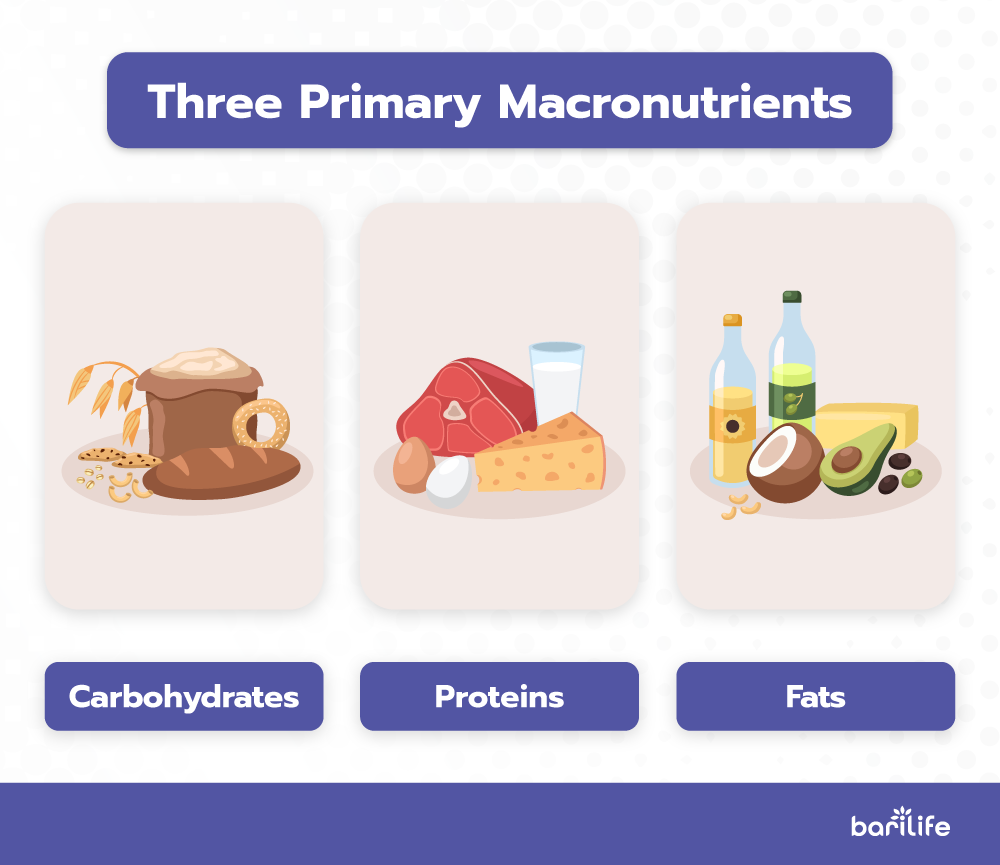
Carbohydrates are the body’s primary source of energy. They are found in foods such as grains, fruits, vegetables, legumes, and dairy products. Carbohydrates can be simple, like sugars, or complex, like starches and fibers.
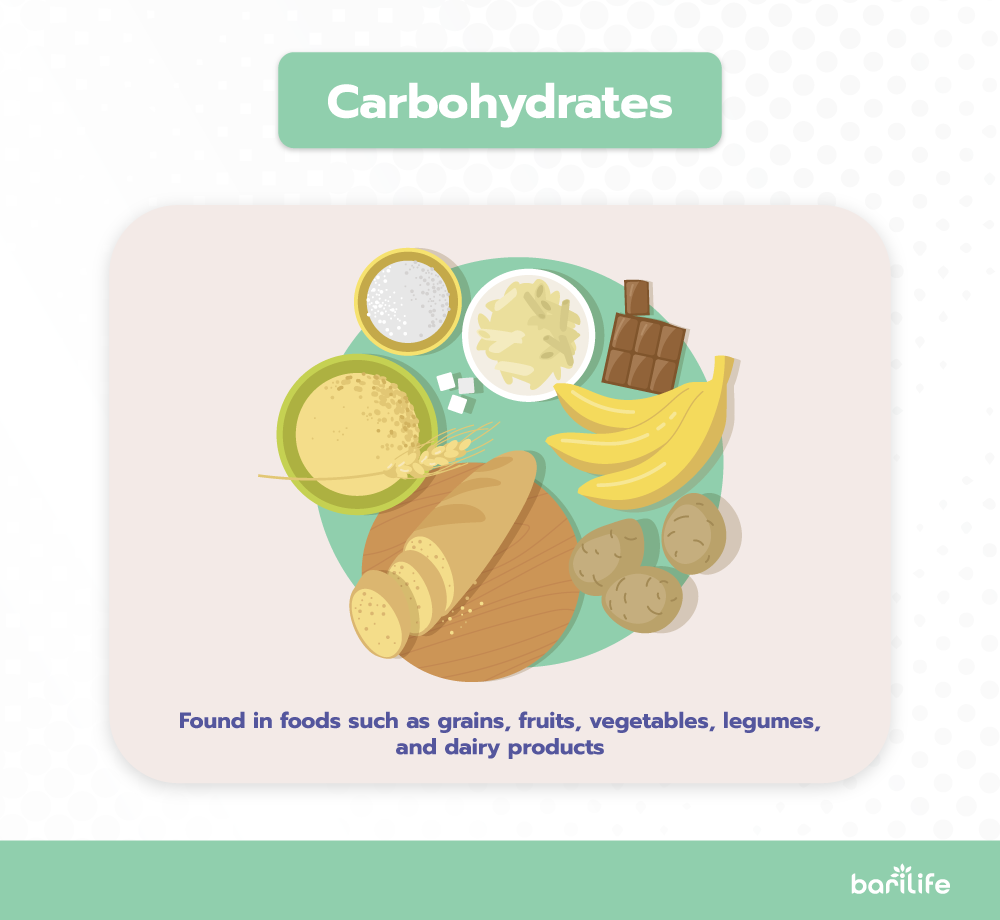
Proteins are vital for building and repairing tissues in the body. They are made up of amino acids, which are the building blocks of proteins. Sources of protein include meat, poultry, fish, eggs, dairy products, legumes, nuts, and seeds.
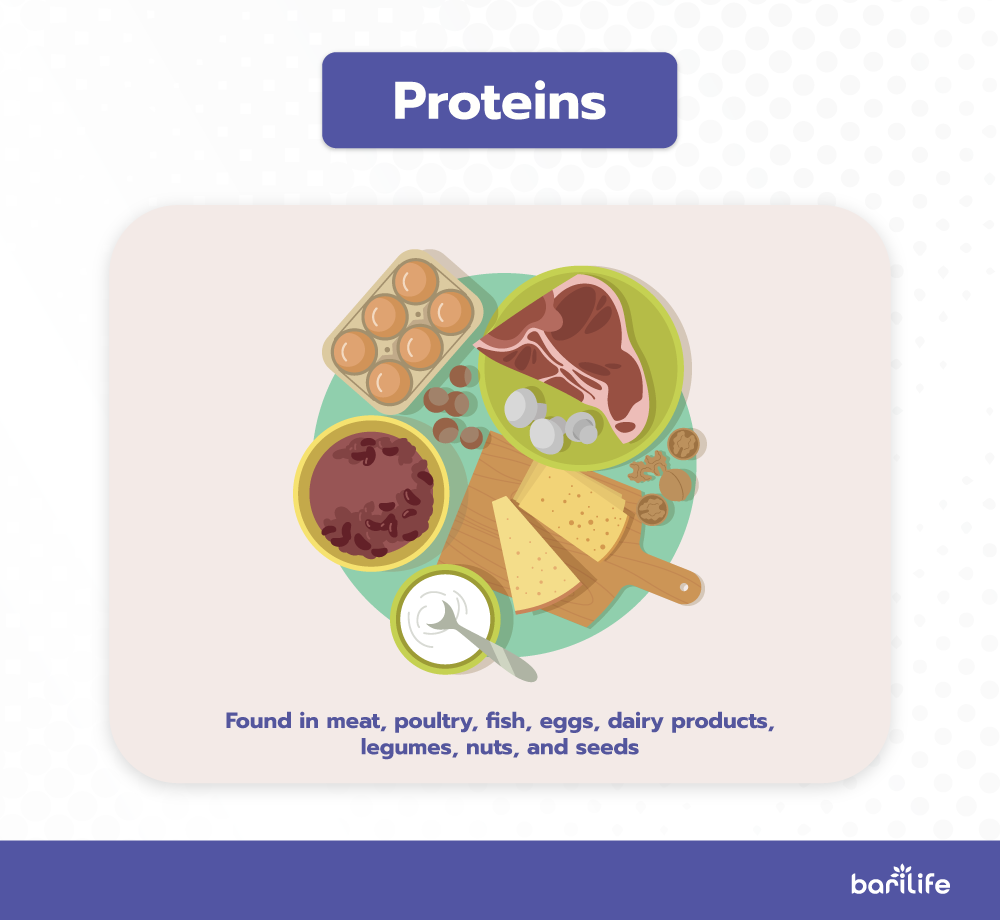
Fats are another important source of energy and play a role in various bodily functions, including hormone production and nutrient absorption. Fats are found in foods like oils, butter, avocado, nuts, seeds, and fatty fish. They can be classified as saturated, unsaturated, and trans fats.
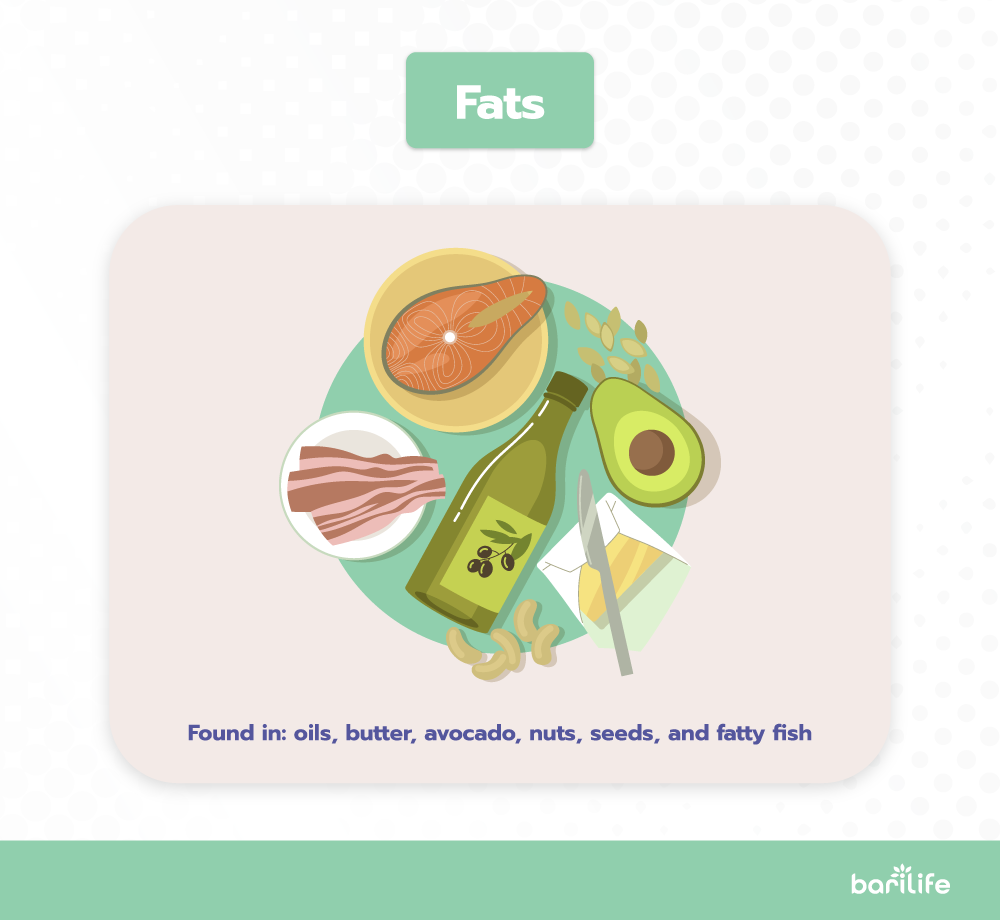
Why are they important?
After bariatric surgery, it’s crucial to ensure a well-balanced diet that includes all three macronutrients: carbohydrates, proteins, and fats. Each macronutrient serves a unique purpose in supporting post-surgery recovery and long-term health.
Proteins
Protein plays several important roles in weight loss and is particularly crucial post-bariatric surgery. Protein is highly satiating, meaning it helps you feel full and satisfied after a meal. Including adequate protein in your diet can help reduce hunger and cravings, making it easier to stick to a calorie-controlled eating plan and achieve weight loss goals.
During weight loss, the body may break down muscle tissue for energy along with fat stores. Consuming sufficient protein helps preserve lean muscle mass, which is important for maintaining metabolic rate and overall body composition. Preserving muscle mass is especially critical during weight loss to prevent the metabolic rate from slowing down.
Protein is also essential for wound healing and tissue repair, aiding in the recovery process after surgery. With the reduced stomach size and changes in digestion, patients may have difficulty consuming adequate nutrients, including protein. Therefore, protein intake becomes crucial to prevent malnutrition and support overall health.
Regardless of the type of bariatric surgery you undergo, your needs for protein increase post-surgery. At minimum, you should aim for 60 grams of protein per day.
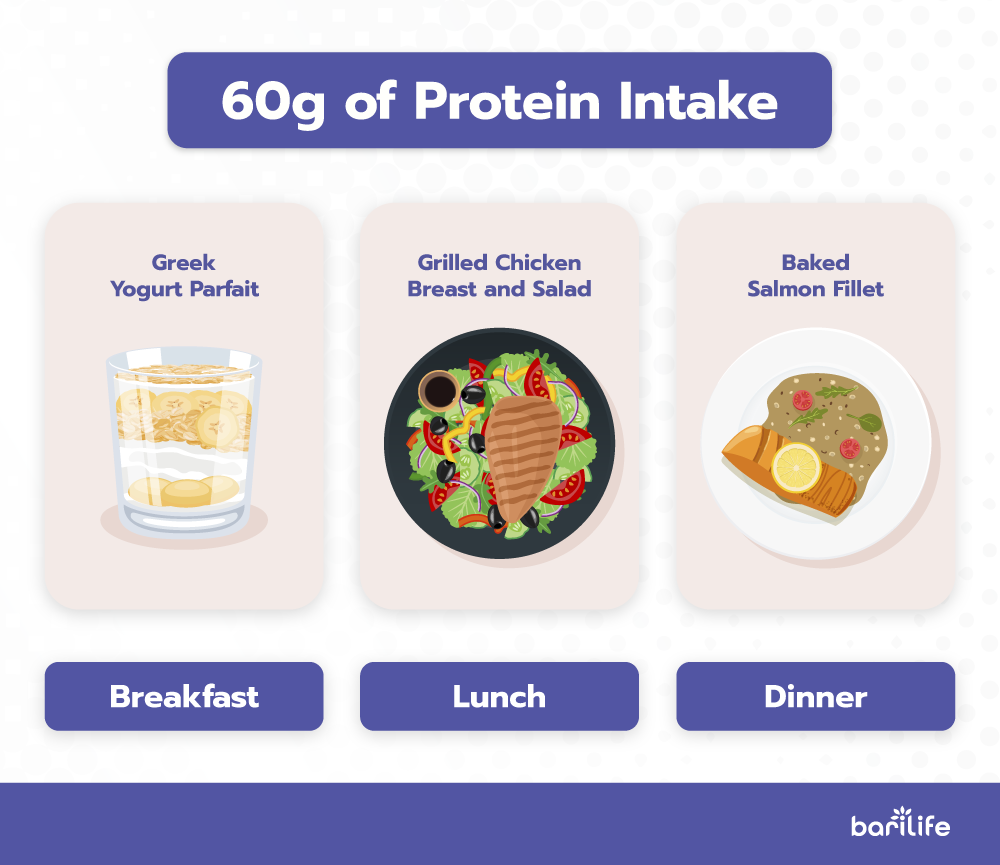
Which can look something like this:
Breakfast:
- Greek yogurt parfait with 1 cup of Greek yogurt (15-20g protein) and 1/2 cup of granola (3-5g protein)
- 1 medium banana
Lunch:
- Grilled chicken breast salad with mixed greens, veggies, and 4 ounces of grilled chicken breast (26g protein)
- 1 tablespoon of vinaigrette dressing
Afternoon Snack:
- 1 ounce of almonds (6g protein)
- 1 medium apple
Dinner:
- Baked salmon fillet (4 ounces, 20-25g protein)
- 1 cup of quinoa (8g protein)
Fats
Dietary fat can play a role in weight loss because it contributes to satiety and helps regulate appetite. Including healthy fats in your diet can help you feel fuller for longer, potentially reducing overall calorie intake and aiding in weight loss.
Fat is also important for the absorption of fat-soluble vitamins (A, D, E, and K), which are essential for various bodily functions.
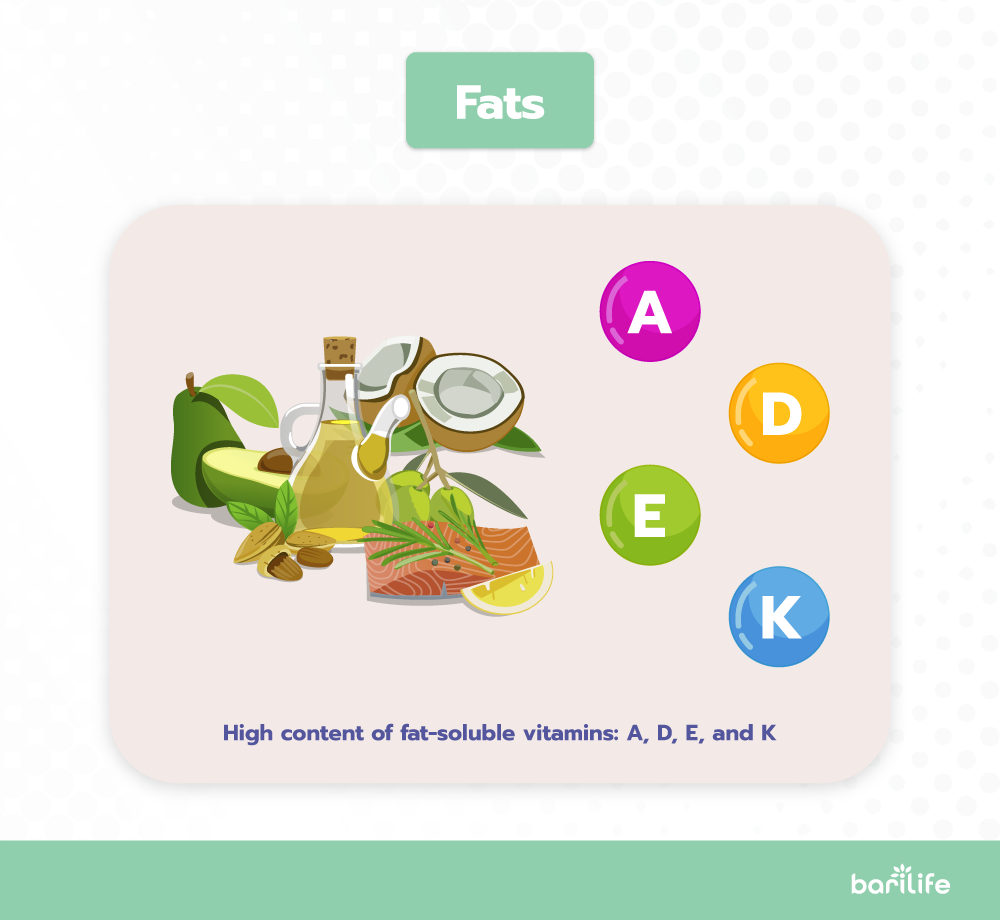
It’s important to note that while fat is beneficial, particularly healthy fats like those found in avocados, nuts, seeds, and fatty fish, patients should still aim to limit their consumption of high-fat foods in order to keep weight off.
Carbohydates
While carbohydrates can be a part of a successful weight loss strategy, the type and amount of carbohydrates consumed, as well as individual factors such as metabolic health and personal preferences, should be considered. Post-bariatric surgery, carbohydrate intake may need to be decreased to support weight loss and optimize nutritional status.
Consuming fewer carbohydrates can help create a calorie deficit, which is essential for weight loss. When you reduce your carbohydrate intake, your body may rely more on stored fat for energy, contributing to weight loss.
Additionally, carbohydrates, especially those with a high glycemic index, can cause spikes in blood sugar levels, leading to increased insulin secretion. High insulin levels can promote fat storage and make it harder for the body to burn stored fat. By moderating carbohydrate intake, individuals may better manage insulin levels, which can facilitate weight loss.
Healthy sources
Incorporating a variety of nutrient-dense foods from all macronutrient groups can help individuals post-bariatric surgery meet their nutritional needs, promote optimal healing, and achieve long-term success in weight management and overall health. Here are some examples of healthy sources of each macronutrient.
Fats
Fats are essential for hormone production, nutrient absorption, and providing a concentrated source of energy. Opt for healthy unsaturated fats and limit saturated and trans fats. Examples of healthy fat sources include:
- Avocados
- Nuts and seeds: Almonds, walnuts, chia seeds, flaxseeds, and pumpkin seeds
- Fatty fish: Salmon, mackerel, sardines, and trout
- Olive oil
- Nut butters: Peanut butter, almond butter, and cashew butter
Proteins
Proteins are crucial for building and repairing tissues, supporting muscle growth, and maintaining a healthy immune system. They are made up of amino acids, which are the building blocks of protein. Healthy sources of protein include:
- Lean meats: Chicken breast, turkey, lean cuts of beef, and pork tenderloin
- Fish: Salmon, tuna, trout, and cod
- Eggs: Whole eggs or egg whites
- Dairy products: Greek yogurt, cottage cheese, and low-fat milk
- Plant-based options: Tofu, tempeh, edamame, lentils, chickpeas, and other legumes and beans
Carbohydrates
Carbohydrates are the body’s primary source of energy, providing fuel for daily activities and exercise. They are essential for brain function and support digestive health when consumed from whole, fiber-rich sources. Examples of healthy carbohydrate sources include:
- Whole grains: Quinoa, brown rice, oats, barley, and whole wheat pasta
- Fruits: Berries, apples, oranges, bananas, and mangoes
- Vegetables: Leafy greens, broccoli, sweet potatoes, carrots, and bell peppers
- Legumes: Lentils, chickpeas, black beans, and edamame
Well-rounded nutrition
Mineral and vitamin deficiencies can be common occurrences after bariatric surgery due to alterations in the digestive tract that affect nutrient absorption. Patients who undergo procedures such as gastric bypass or sleeve gastrectomy may be at increased risk of deficiencies in essential vitamins and minerals, including vitamin B12, iron, calcium, vitamin D, and folate, among others.
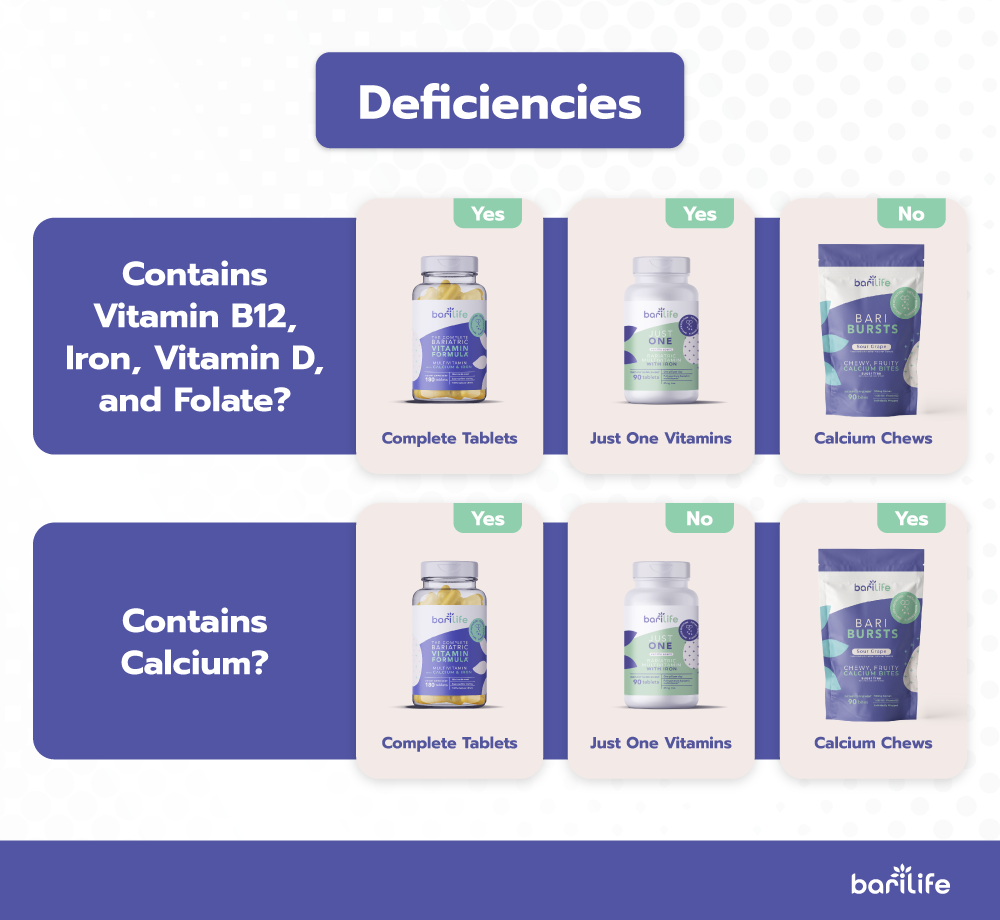
These deficiencies can lead to a range of health issues, including anemia, osteoporosis, neurological complications, and impaired immune function. Therefore, ensuring a well-rounded and nutritionally adequate diet is crucial for individuals after bariatric surgery. Additionally, healthcare providers may recommend dietary supplements to help meet specific nutrient needs and prevent deficiencies.
We recommend taking our Just One 30 ct Multivitamin and the Calcium chews to prevent nutrient deficiency.
Summary
In summary, understanding your individual macronutrient requirements is crucial for achieving successful weight management and promoting overall health, especially after bariatric surgery. Proteins, fats, and carbohydrates each play unique roles in supporting post-surgery recovery and long-term well-being. Prioritizing nutrient-dense foods from all macronutrient groups, such as lean proteins, healthy fats, and complex carbohydrates, can help meet nutritional needs and optimize healing. Additionally, it’s essential to be mindful of potential nutrient deficiencies and consider supplementation under the guidance of healthcare providers. By adopting a well-rounded approach to nutrition and staying informed about your body’s needs, you can pave the way for a healthier, more vibrant life.




What are your tips and tricks to post-bariatric success?